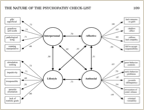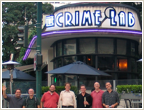
Craig Neumann


My primary research is focused on the development, structure, and correlates of psychopathic traits. My published work thus far has shown that psychopathic features are evident in adolescence, are structurally similar across heterogeneous samples, and have many of the same correlates across diverse groups of individuals. One essential finding that has emerged from this work is that all aspects of the disorder (e.g., deceitful, manipulative, remorseless, under-controlled, and reckless behavior) reflect antisocial tendencies. This is not to imply that psychopathy and antisocial personality disorder are isomorphic, but instead highlights the fundamental dissociality of psychopathy. Many contemporary psychopathy researchers assume that an affective deficit is the core to psychopathy, however this view fails to appreciate that more overt antisocial behaviors covary genetically with and at times precede the affective features of psychopathy. Thus, it seems more reasonable to me to assume that there are interactive and reciprocal processes involved in the expression of the disorder. As such, a viable hypothesis is that exposure to and engagement in antisocial behavior may very well lead to a callousing and desensitizing of affective experience.






The psychopath, however perfectly he mimics man theoretically, that is to say, when he speaks for himself in words, fails altogether when he is put into the practice of actual living. His failure is so complete and so dramatic that it is difficult to see how such a failure could be achieved by anyone less defective than a downright madman (Cleckley 1976, p. 370)
My Research


